In this fast-changing digital environment, every company is trying to strengthen its presence online and to ensure that customer experiences are paramount. In 2025 the importance of a DXP has never been felt more strongly. It is a software platform designed for creating and optimizing digital experiences across multiple channels and thereby engaging audiences in an efficient manner.
In this blog, let's look at the Best Digital Experience Platform in 2025, the features of each, the benefits derived from them and why they rank in a crowded market. Be it a business or enterprise the choice for an appropriate DXP will have serious implications on your entire digital strategy.
What is a Digital Experience Platform?
A digital experience platform is an integrated set of technologies designed to enable the management and optimization of contextualized digital experiences across multi experience customer journeys. DXP will be important for those businesses that want to present personalized and consistent experiences that are engaging via the different touchpoints and social media to other channels.
Key Features of the Best DXP Platforms
In the case of Best Digital Experience Platforms, there are a few key features that distinguish the top solutions from the rest. Here are the essential features that make a DXP powerful and effective:
- Omnichannel Content Management: Seamless content distribution across websites and other digital channels.
- AI-Powered Personalization: Advanced machine learning algorithms that customize content and recommendations based on user behavior.
- Customer Data Integration: Unified customer profiles for an omnichannel experience, integrated from various touchpoints.
- Headless Architecture: A decoupled frontend and backend architecture that lets one deliver experiences across interfaces in flexible ways.
- Analytics & Insights: Real-time data tracking and reporting in the measurement of customer engagement and strategy optimization.
- Workflow Automation: Automation of workflows of creation, approval, and publication into one seamless flow.
- Security & Compliance: Strong security; compliance with GDPR and CCPA for data safety.
- Integration Capabilities: Compatibility with third-party tools, CRM, eCommerce, and marketing automation platform.
What to Consider When Choosing a DXP?
Getting the right Best Digital Experience Platform is an activity between business needs assessment, scalability, and technological needs. Following are a few points to be considered in choosing a DXP:
- Business Goals & Requirements: Identify what your goals are with the DXP, whether customer engagement, personalization, or site performance.
- Scalability & Flexibility: The platform should be able to scale with your growing business and expand to meet the needs of the future.
- Ease of Use: It must have an intuitive UI that makes both technical and nontechnical teams highly productive with content management.
- Integration Capabilities: It should be that kind of DXP which can easily integrate with existing marketing, CRM, and analytics tools.
- Customer Support & Community: Optimize for best customer support and community behind the product.
Best Digital Experience Platforms (DXP)
1. Mouseflow
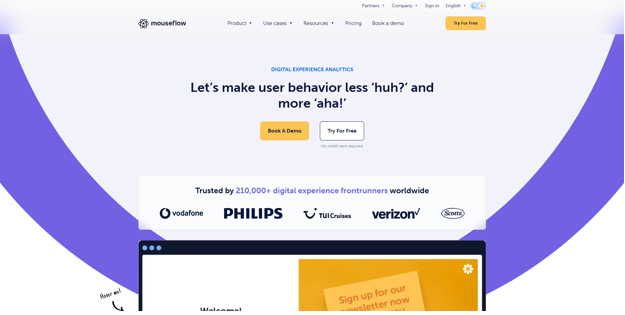
Mouseflow is an extremely powerful DXP, offering a suite of tools to analyze and optimize digital experiences. It gives valuable insight into user behavior through its session replay, heatmaps, and conversion funnels, hence helping businesses identify areas for improvement.
Best Use Case: Ideal for e-commerce websites and SaaS platforms.
Pricing: $24/month
Key Features:
- Session replay and heatmaps
- Conversion funnel analysis
- Form Analytics
- Feedback surveys
- A/B testing
Pros:
- Easy to use with an intuitive interface
- Provides detailed insights into user behaviour
- Offers a wide range of analytics tools
- Supports A/B testing for optimization
Cons:
- Limited customization options for reports
- Can be expensive for small businesses
2. Contentstack
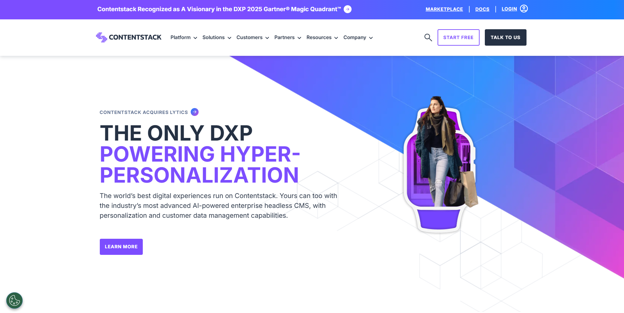
Businesses can develop individualized digital experiences across channels with Contentstack, a headless CMS. It is very adaptable for companies of all sizes because to its API-first approach, which enables smooth connections with various tools and platforms.
Best Use Case: Ideal for enterprises that have highly complex content needs.
Pricing: Custom pricing based on the specific needs.
Key Features:
- Headless CMS
- API-first architecture
- Content modeling and management
- Multi-language support
- Real-time collaboration
Pros:
- Flexible and scalable architecture
- Easy integration with third-party tools
- Robust content management capabilities
- Supports multi-language content
Cons:
- Steeper learning curve for non-technical users
- Higher cost compared to traditional CMS
3. Nextiva
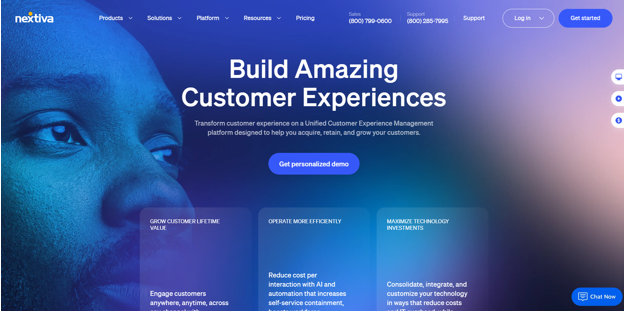
A single communication system, Nextiva provides a variety of solutions to improve digital experiences. From consumer interaction to team collaboration via video and audio conference. For companies wishing to enhance customer relations and streamline communications, Nextiva offers a comprehensive solution.
Best Use Case: Ideal for customer service teams and sales departments.
Pricing: $18.95/user/month
Key Features:
- Voice and video conferencing
- Team collaboration tools
- Customer engagement solutions
- CRM integration
- Analytics and reporting
Pros:
- Comprehensive communication tools
- Easy integration with CRM systems
- User-friendly interface
- Reliable customer support
Cons:
- Limited customization options
- Can be expensive for small businesses
4. Expresia
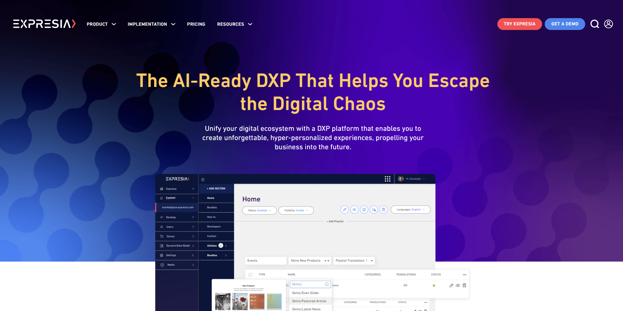
Expresia is a digital experience platform to help companies craft and manage personalized digital experiences. With an intuitive drag and drop interface, Expesia makes it really easy to design and deploy engaging digital experiences with minimal technical knowledge.
Best Use Case: Ideal for small businesses.
Pricing: Expresia offers custom pricing based
Key Features:
- Drag-and-drop interface
- Personalization and targeting
- Multi-channel content delivery
- Analytics and reporting
- Integration with third-party tools
Pros:
- User-friendly interface
- Easy to set up and use
- Robust personalization features
- Supports multi-channel content delivery
Cons:
- Limited advanced features
- May not be suitable for large enterprises
5. Adobe Experience Manager
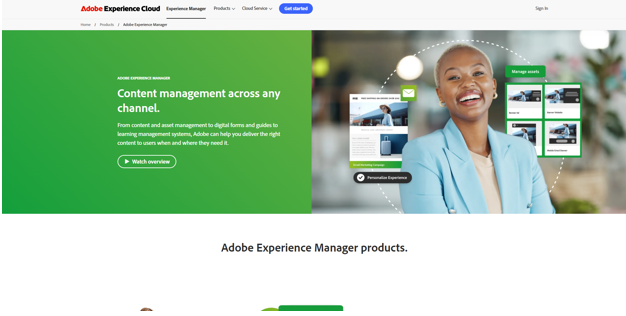
Adobe Experience Manager is an all-encompassing DXP that provides a set of tools to build and optimize digital experiences. AEM is powerful in content management, whereby enterprises are empowered to create and deliver personalized experiences across multichannel interfaces, including the web and social media.
Best Use Case: Ideal for small businesses large organizations.
Pricing: Offers custom pricing.
Key Features:
- Content management and delivery
- Personalization and targeting
- Multi-channel content delivery
- Analytics and reporting
- Integration with Adobe Marketing Cloud
Pros:
- Robust content management capabilities
- Seamless integration with Adobe Marketing Cloud
- Scalable and flexible architecture
- Comprehensive personalization features
Cons:
- Expensive for small businesses
6. Liferay
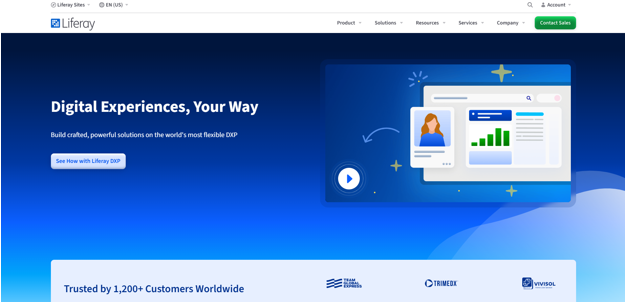
Liferay is an open source DXP that hosts a number of functionalities to help in designing and managing digital experiences. Being very versatile the architecture of Liferay allows for customization toward the peculiar needs of each enterprise. Not less important is the seamless integration of Liferay considering the big number and variety of third party applications with which this solution easily connects.
Best Use Case: Ideal for enterprises having unique digital experience needs.
Pricing: Liferay offers custom pricing.
Key Features:
- Open-source platform
- Content management and delivery
- Personalization and targeting
- Multi-channel content delivery
- Integration with third-party tools
Pros:
- Flexible and customizable architecture
- Robust integration capabilities
- Open-source with a strong community
- Scalable for businesses of all sizes
Cons:
- Requires technical expertise to customize
- Limited out-of-the-box features
7. Experro
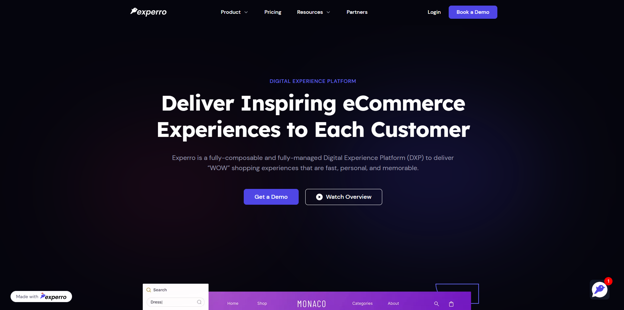
Experro is a DXP that helps businesses provide experiences that are relevantly tailored and engaging. Every company can design products based on user behavior and preferences thanks to its AI-driven customizing engine. Furthermore, it offers powerful reporting and analytics features, allowing companies to make educated decisions and consistently improve their digital strategies.
Best Use Case: Ideal for e-commerce and content heavy websites.
Pricing: Experro offers custom pricing
Key Features:
- AI-driven personalization
- Content management and delivery
- Multi-channel content delivery
- Analytics and reporting
- Integration with third-party tools
Pros:
- AI-driven personalization features
- Robust analytics and reporting
- Easy integration with third-party tools
- Scalable for businesses of all sizes
Cons:
- Can be expensive for small businesses
8. Optimizely
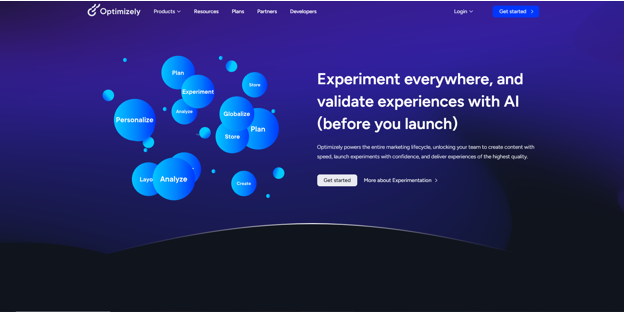
A DXP called Optimizely provides a number of tools for developing and refining digital experiences. Businesses can experiment and improve the digital experience to increase engagement and conversion by using Optimizelys robust experimentation platform. Optimizely is adaptable for businesses of all sizes because it also provides strong content management and customisation features.
Best Use Case: Ideal for e-commerce and SaaS platforms.
Pricing: Optimizely offers custom pricing
Key Features:
- Experimentation and optimization
- Content management and delivery
- Personalization and targeting
- Multi-channel content delivery
- Analytics and reporting
Pros:
- Powerful experimentation and optimization tools
- Robust content management capabilities
- Comprehensive personalization features
- Scalable for businesses of all sizes
Cons:
- Can be expensive for small businesses
9. Acquia
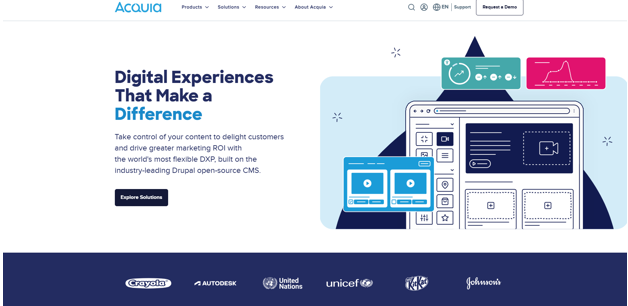
Acquia is a DXP and provides a number of tools to develop and manage digital experiences. Its cloud based platform allows companies to serve personalized experiences across various channels. Above this, Acquia extends strong integration capabilities, making it easy to connect with other tools and platforms.
Best Use Case: Ideal for large organizations.
Pricing: Acquia offers custom pricing based
Key Features:
- Cloud-based platform
- Content management and delivery
- Personalization and targeting
- Multi-channel content delivery
- Integration with third-party tools
Pros:
- Cloud-based with high scalability
- Robust integration capabilities
- Comprehensive content management features
- Supports multi-channel content delivery
Cons:
- Can be expensive for small businesses
- Requires technical expertise to fully utilize
10. Squiz
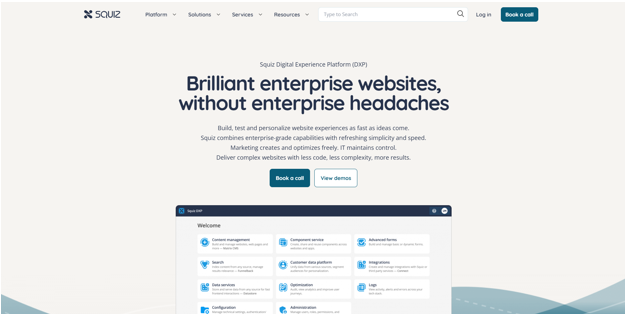
Squiz is a DXP complete with tools to construct and manage digital experiences. By the flexible nature of its architecture, Squiz can let businesses shape their digital experiences according to their unique needs. In addition, it is easily integratable with other tools and platforms due to its robust integration capabilities.
Best Use Case: Ideal for enterprise businesses with unique digital experience requirements.
Pricing: Squiz offers custom pricing
Key Features:
- Flexible architecture
- Content management and delivery
- Personalization and targeting
- Multi-channel content delivery
- Integration with third-party tools
Pros:
- Flexible and customizable architecture
- Robust integration capabilities
- Scalable for businesses of all sizes
- Comprehensive content management features
Cons:
- Requires technical expertise to customize
- Limited out-of-the-box features
Conclusion:
DXP has become so crucial in 2025 that no business can say, "I can do without it." Only those companies will lead and set trends in the corporate world in providing personalized and seamless experiences, as well as more engaging through all the digital channels, that invest in one of the best Digital Experience Platforms. Be it a full-featured content management system, AI-driven personalization, or strong analytics-the above platforms provide a complete feature list for your requirements.
When choosing a DXP one has to think about ease of use and integrations related to the particular needs of your business. In this way you will be able to upgrade your digital strategy and ensure business growth in 2025 and beyond.
Keep in mind that the ideal DXP is one that supports your company objectives and gives you the tools you need to produce incredible digital experiences. Spend some time carefully evaluating each platform to determine which one best meets your goals.

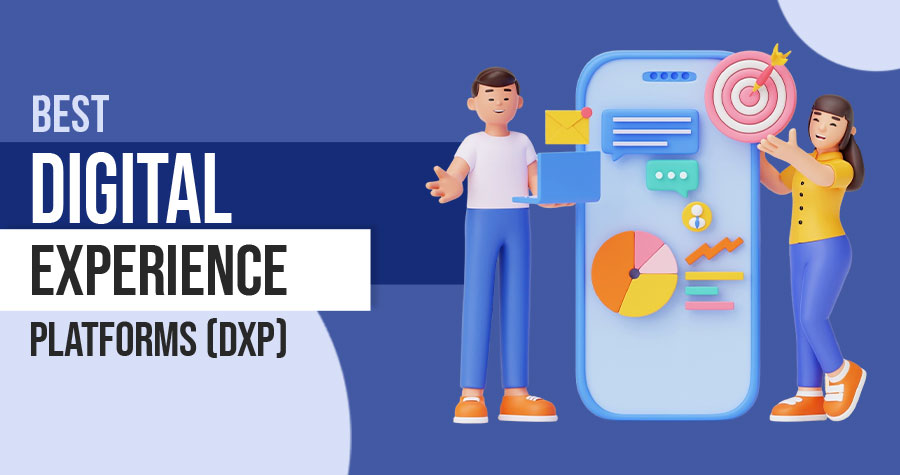
 Table of Content
Table of Content










